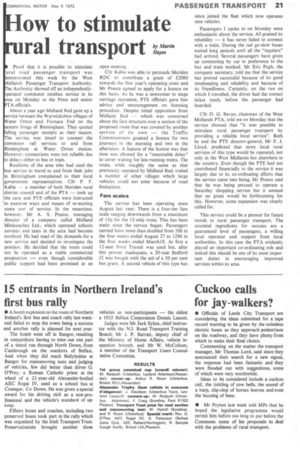ow to stimulate ral transport
Page 23

If you've noticed an error in this article please click here to report it so we can fix it.
by Martin Hayes
Proof that it is possible to stimulate ural road passenger transport was emonstrated this week by the West idlamis Passenger Transport Authority. he Authority showed off an independentlyperated commuter minibus service in its rea on Monday to the Press and senior A officials.
About a year ago Midland Red gave up a ervice between the Warwickshire villages of ater Orton and Furnace End on the astern fringe of Birmingham. They quoted ailing passenger receipts as their reason. he service was timed to connect the commuter rail services to and from Birmingham at Water Orton station. However, connections were not reliable due to delays either to bus or train.
Residents of the area who had used the bus service to travel to and from their jobs in Birmingham complained to their local government representatives. Cllr P. F.
Kellie a member of both Meriden rural district council and of the PTA — took up the ease and PTE officials were instructed to examine ways and means of re-starting some sort of service. In the meantime, however. Mr A. S. Preece, managing director of a company called Midland Minicoaches Ltd., which operated schools services and taxis in the area had become involved. He had read of the demands for a new service and decided to investigate the position. He decided that the route could not be operated as a viable commercial proposition — even though considerable public support had been promised at an open meeting.
Cllr Kellie was able to persuade Meriden RDC to contribute a grant of /2080 towards the first year's operating costs and Mr Preece agreed to apply for a licence on this basis. As he was a newcomer to stage carriage operation, PTE officials gave him advice and encouragement on licensing procedure. Despite initial opposition from Midland Red — which was concerned about the fare structure over a section of the proposed route that was covered by another service of its own -the Traffic Commissioners granted a licence for two journeys in the morning and two in the afternoon. A feature of the licence was that time was allowed for a "reasonable delay" to cover waiting for late-running trains. The route, while roughly the same as that previously operated by Midland Red, visited a number of other villages which large vehicles could not enter because of road limitations.
Fare scales
The service has been operating since August last year. There is a four-tier fare scale ranging downwards from a maximum of 15p for the 12-mile route. This has been static since the service began. Passengers carried have more than doubled from 506 in the four weeks ended August 27 to 1286 in the four weeks ended March10. At first a 12-seat Ford Transit was used but, after this proved inadequate, a 20-seat Bedford 12 was bought with the aid of a 50 per cent bus grant. A second vehicle of this type has since joined the fleet which now operates nine vehicles.
Passengers I spoke to on Monday were enthusiastic about the service. All praised its reliability — it has never failed to connect with a train. During the rail go-slow buses waited long periods until all the "regulars" had arrived. Several passengers have given up commuting by car in preference to the bus and train method. Mr Eric Pugh, the company secretary, told me that the service has proved successful because of its good timekeeping and reliability and because of its friendliness. Certainly, on the run on which 1 travelled, the driver had the correct ticket ready before the passenger had boarded.
Cllr D. G. Bevan, chairman of the West Midlands PTA, told me on Monday that the service showed that "it was possible to stimulate rural passenger transport by providing a reliable local service". Both he and the PTE director-general, Mr F. J. Lloyd, predicted that more local rural services of this type would be operated, not only in the West Midlands but elsewhere in the country. Even though the PTE had not contributed financially to the service it was largely due to its co-ordinating efforts that the service came into being. Mr Preece said that he was being pressed to operate a Saturday shopping service but it seemed that no grant would be forthcoming for this. However, some expansion was clearly called for.
This service could be a pioneer for future trends in rural passenger transport. The essential ingredients for success are a guaranteed level of passengers, a willing local operator and support from local authorities. In this case the PTA evidently played an important co-ordinating role and indeed this should be one of its most important duties in encouraging improved services within its area.




























































































